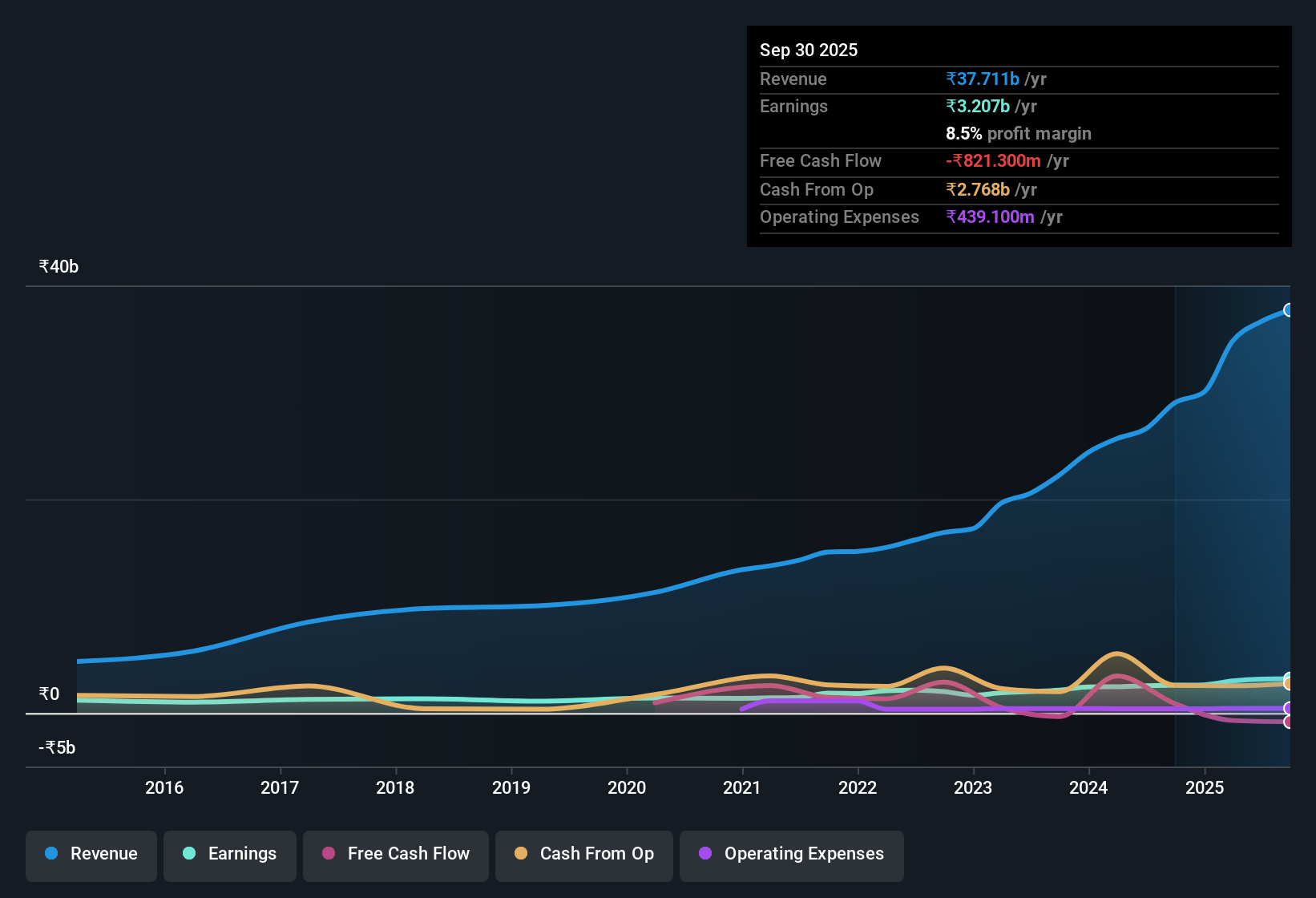- India
- /
- Telecom Services and Carriers
- /
- NSEI:RAILTEL
RailTel Corporation of India's (NSE:RAILTEL) Solid Earnings May Rest On Weak Foundations
RailTel Corporation of India Limited's (NSE:RAILTEL) robust recent earnings didn't do much to move the stock. We believe that shareholders have noticed some concerning factors beyond the statutory profit numbers.

Zooming In On RailTel Corporation of India's Earnings
One key financial ratio used to measure how well a company converts its profit to free cash flow (FCF) is the accrual ratio. In plain english, this ratio subtracts FCF from net profit, and divides that number by the company's average operating assets over that period. The ratio shows us how much a company's profit exceeds its FCF.
Therefore, it's actually considered a good thing when a company has a negative accrual ratio, but a bad thing if its accrual ratio is positive. That is not intended to imply we should worry about a positive accrual ratio, but it's worth noting where the accrual ratio is rather high. That's because some academic studies have suggested that high accruals ratios tend to lead to lower profit or less profit growth.
Over the twelve months to September 2025, RailTel Corporation of India recorded an accrual ratio of 0.24. We can therefore deduce that its free cash flow fell well short of covering its statutory profit. Even though it reported a profit of ₹3.21b, a look at free cash flow indicates it actually burnt through ₹821m in the last year. It's worth noting that RailTel Corporation of India generated positive FCF of ₹881m a year ago, so at least they've done it in the past.
That might leave you wondering what analysts are forecasting in terms of future profitability. Luckily, you can click here to see an interactive graph depicting future profitability, based on their estimates.
Our Take On RailTel Corporation of India's Profit Performance
RailTel Corporation of India's accrual ratio for the last twelve months signifies cash conversion is less than ideal, which is a negative when it comes to our view of its earnings. Because of this, we think that it may be that RailTel Corporation of India's statutory profits are better than its underlying earnings power. Nonetheless, it's still worth noting that its earnings per share have grown at 59% over the last three years. The goal of this article has been to assess how well we can rely on the statutory earnings to reflect the company's potential, but there is plenty more to consider. So while earnings quality is important, it's equally important to consider the risks facing RailTel Corporation of India at this point in time. Case in point: We've spotted 2 warning signs for RailTel Corporation of India you should be mindful of and 1 of them makes us a bit uncomfortable.
Today we've zoomed in on a single data point to better understand the nature of RailTel Corporation of India's profit. But there are plenty of other ways to inform your opinion of a company. For example, many people consider a high return on equity as an indication of favorable business economics, while others like to 'follow the money' and search out stocks that insiders are buying. So you may wish to see this free collection of companies boasting high return on equity, or this list of stocks with high insider ownership.
New: AI Stock Screener & Alerts
Our new AI Stock Screener scans the market every day to uncover opportunities.
• Dividend Powerhouses (3%+ Yield)
• Undervalued Small Caps with Insider Buying
• High growth Tech and AI Companies
Or build your own from over 50 metrics.
Have feedback on this article? Concerned about the content? Get in touch with us directly. Alternatively, email editorial-team (at) simplywallst.com.
This article by Simply Wall St is general in nature. We provide commentary based on historical data and analyst forecasts only using an unbiased methodology and our articles are not intended to be financial advice. It does not constitute a recommendation to buy or sell any stock, and does not take account of your objectives, or your financial situation. We aim to bring you long-term focused analysis driven by fundamental data. Note that our analysis may not factor in the latest price-sensitive company announcements or qualitative material. Simply Wall St has no position in any stocks mentioned.
About NSEI:RAILTEL
RailTel Corporation of India
Provides broadband telecom and multimedia networks and services in India.
Flawless balance sheet with moderate growth potential.
Similar Companies
Market Insights
Community Narratives



